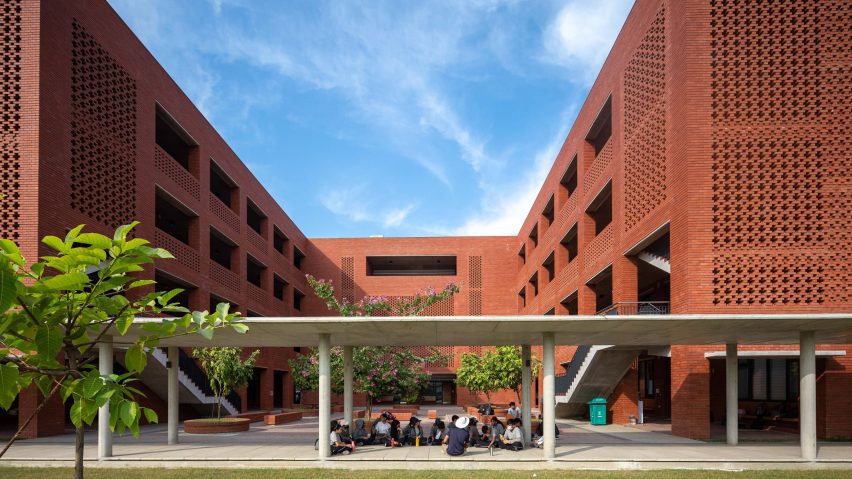Decorative brick-clad buildings fold around courtyards at the Aga Khan Academy Dhaka, a boarding school in Bangladesh designed by British practice Feilden Clegg Bradley Studios with architecture studio Shatotto Architecture for Green Living.
Located in the capital Dhaka, the academy was created by Feilden Clegg Bradley Studios and Shatotto Architecture for Green Living for the educational network Aga Khan Academies.
The Aga Khan Academy Dhaka comprises a series of four-storey volumes that are clad in brick and nestle within a highly-developed urban site bordered by a large motorway.
They are arranged around green outdoor spaces intended to offer relief from these built-up surroundings while creating external areas for both play and education.
"The rate of development around the site has been intensive and fast," studio partner Ian Taylor told Dezeen.
"The incorporation of extensive planting – including roof terrace landscaping – improves microclimate and air quality, and creates friendly outdoor learning areas, and social settings in the centre of what is otherwise a very harsh built-up city centre location," he continued.
The school is the latest addition to a series of four academies established by Aga Khan, the founder of the Aga Khan Development Network.
Its focal point is a central tree-lined field, known as the Maidan. Informed by traditional Bangladeshi university design, this will be used for spiritual and recreational activities.
"The central Maidan, following historical Bangladesh precedents in university design, creates a green lung in the city fabric, and distributes the school buildings to provide access to good ventilation from the prevailing wind directions throughout the year," explained Taylor.
Alongside the main field, the complex comprises a series of smaller courtyards that are connected by concrete canopies for shelter and feature brick benches and planters.
One of these courtyards features an amphitheatre-like arrangement of steps punctuated by short brick walls where larger gatherings of students can take place.
The courtyards are bordered by the series of four-storey brick-clad buildings that house classrooms for 1,200 students along with residential and administrative spaces.
According to Feilden Clegg Bradley Studios, brick was used for the school buildings in order to reinvigorate "local craft skills" while creating a "strong contrast to the predominant use of render and concrete in the new surrounding buildings".
Across the facades of each building, differently shaped perforations have been introduced in the brickwork to showcase traditional local techniques.
In other places, recessed windows, screens and protruding brickwork columns provide shading to the classrooms and make space for covered balconies and walkways.
Inside, the white-walled classrooms vary in size and accommodate facilities for nursery, primary and secondary school-aged pupils. An additional building containing administrative offices, meeting rooms, computer rooms and a library is located in one corner of the complex.
Working with engineering studio Max Fordham, Feilden Clegg Bradley Studios and Shatotto Architecture for Green Living arranged the classrooms to be passively heated and shaded throughout the year and minimise energy consumption.
"The classrooms are orientated to minimise solar gain in summer, with external walkways and adjacent buildings set out to provide passive solar shading from the morning sun throughout the year, whilst also providing good daylight and views out," said Max Fordham director Iain Shaw.
Other schools featured on Dezeen include a school in China spread across brightly coloured blocks and a brick music school topped with a roof made from coconut wood.
Elsewhere in Bangladesh, Sthapotik recently completed a mausoleum with a "chandelier" of skylights and brick turrets.
The photography is by Asif Salman.
Project credits:
Architect (UK): Feilden Clegg Bradley Studios
Architect (Bangladesh): Shatotto Architecture for Green Living and Prof. Rafiq Azam
Landscape architect (UK): Grant Associates
Landscape architect (Bangladesh): Shatotto Architecture for Green Living and Prof. Rafiq Azam
Structural engineer (UK): AKT II
Structural engineer (Bangladesh): TDM
Building services engineer (UK): Max Fordham
Building services engineer (Bangladesh): EMCS
Civil engineer (UK): AKT II
Civil engineer (Bangladesh): JPZ
Acoustic engineer (UK): Max Fordham
Cost consultant (UK): Gardiner & Theobald
Cost consultant (India): Turner & Townsend
Brickwork consultant (Bangladesh): Studio D’Void
Project nanager (Bangladesh): Deltadesh
Main contractor: Charuta

